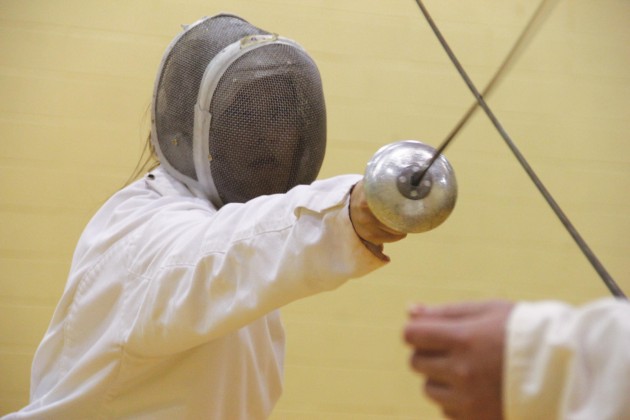
When Carly Pietrzak was considering DePauw, one club that caught her eye and attracted her to the university was the fencing club.
Now a junior, Pietrzak and sophomore Frank Hu have made that desire a reality. They have re-founded the DePauw fencing club after years of neglect.
The club uses equipment left by the original group and has attracted a following of students interested in the fine art of sword fighting. For both Pietrzak and Hu, the club is a result of their passion for the sport and their desire to share it with others.
Pietrzak started fencing when she was eight years old and has been fencing for 10 years since. After seeing an advertisement in a local newspaper, she was convinced to try it out.
"Once I started it, I really enjoyed it. It's very unique," Pietrzak said. "At first it was intimidating because it's a one-on-one sport. There is no team to back you up."
Hu began fencing his freshman year in high school in Bridgeport, Conn. because of his one childhood wish to have a sword. After playing volleyball, Hu enjoyed the individuality and excitement of fencing.
"There is no other thrill I've experienced than fencing someone else," Hu said. "I enjoy the adrenaline rush because it's almost like being in a real sword fight."
As both Pietrzak and Hu explain, it's very intimidating to face up one-on-one with opponents. Because of the high adrenaline rush and reliance on instinct, mastering technique and skill is required for success.
"In fencing, because it's one-on-one, you have to be able to predict what your opponent does," Hu said. "The basic skills take time to pick up. Once you pick them up, the most difficult part of the sport is getting into your opponent's head and get them to do what you want them to do."
There are three weapons in fencing: the foil, which is used by the club, the saber and epee. The grips of all three are different, as well as the techniques and skills.
"You want to stick with one because all the rules are different with each weapon," Pietrzak said. "It's not just the techniques but the rules as well, different areas are the target."
At the start of this semester, Hu, who hadn't fenced since he graduated from high school, placed a post on e-services looking for someone to fence with. Pietrzak responded.
"I was very disappointed to come here and find out that [the club] no longer existed," Pietrzak said. "We decided that it would be great if we had more people to do this with."
The original club was disbanded, according to Hu, many years ago when a kinesiology professor left and no one remained to continue it. Pietrzak and Hu began advertising on Facebook and e-services in hopes of finding more people to fence with. The students who came possessed a genuine interest in the sport, and the group held its first practice on Saturday, Oct. 29.
"We had about 15 people show up the first practice. Frank and I were so excited, because we didn't expect that many people," Pietrzak said. "It was very nerve racking because we knew what we were doing, but we were not sure how to teach the students."
The students have been catching on a lot faster than Pietrzak and Hu expected. They started with working on the footwork and they advanced very quickly with that skill.
"I'm glad that it's on campus, because it's different from a lot of sports out there," said junior John Fotsch. "It's physically engaging as opposed to other sports. So it's nice to get up and do that as it's self-challenging, because I want to get to a good point, because I want to be a very good fencer."
As the club moves forward, Pietrzak and Hu submitted a proposal to the allocations board for new equipment. Hu proposed a far above average $6,000 request that included electronic suits used in real competition to determine which fencer hit the other first. Also, new helmets and swords that work with the electronic equipment were included in the proposal.
Because they are a first semester group, however, the club can only receive a maximum of $1,000 for new equipment.
"That's where the endpoint for fencing is: scoring points electrically," Hu said. "There's nothing more satisfying than to hear the buzz when you score."
The two student teachers want to compete in events soon and fence against big schools like Purdue University and Indiana University.
"I want it to be something that stays with the university," Pietrzak said.
For now, the group will continue to work on basic skills and grow in passion for the sport like Pietrzak and Hu have done throughout their years of practice.
"Our goal is to get the students comfortable enough to compete," Hu said. "We want to represent DePauw University on different campuses and in different events."
